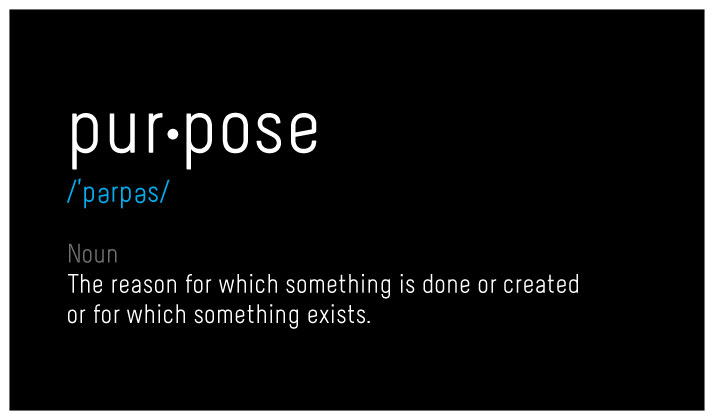Each Tuesday afternoon we have a meeting in the International Affairs division at Dallas Baptist University. The purpose of this meeting is to Encourage, Inspire, Pour Into, and Enable our teams in their leadership and their individual purposes within our division. We call this meeting the Purpose & Leadership meeting. This past Tuesday, I shared with the group my personal convictions and beliefs about Purpose.

Reflecting on this past meeting, I also wanted to share with you “Why I do What I do”. I have always felt that in order to do something meaningful, you need to know the motivations or purpose beforehand. As an example for your leadership, I truly desire to share part of the “purpose” journey God has brought me on. I pray it is helpful for you who may be on this same journey now. There are three major areas (The Gospel, My Doctorate, Leading at the Christian University) that I would like to highlight for you in regards to the purpose and motivations behind “Why I do What I do”.
The Gospel
First and foremost, I have highly personally experienced the grace and love of God though our savior Jesus Christ. As a Christian, we refer to this as “The Gospel.” My life has been transformed as a response to the gospel of Jesus Christ, and I have in turn given my life to relentlessly follow Jesus. I see that following Jesus is much more than simply knowing in my mind that He died on the cross for my sins, regular church attendance, or a set of rules to follow. Following Jesus is living his teachings, following the promptings of the Holy Spirit, and waiting expectantly for his return. By living Jesus’s teaching, I have been led to an understanding of my purpose in life, as well as given a burden heart to serve others.
I believe that in the gospel of Jesus Christ, I have a purpose in an epic and cosmic plan. I believe this purpose is God revealing and reconciling all things to him, which is the greatest cause known to man. For these purposes, I have greater meaning and more fulfillment than anything I can ever hope to know or achieve on my own. I believe that each of us are called or purposed by God in this same plan, but that we need to follow Jesus before that can be made known to us. In a practical way, I see the purposes of Jesus penetrating all aspects of my life including my job, which I would refer to as a “calling.”
My Doctorate
Second, and through my doctoral program, I have encountered a strong understanding for how “purpose” contributes to organizational leadership. As an example Burns (1978) describes this very well in the transformational leadership theory of inspirational motivation. I consider purpose to be a clear understanding for how one makes meaning out of their life, and how this meaning becomes valuable for a cause, for others, and for oneself. Once known, purpose acts as a guiding light and rocket fuel for one’s life or calling.
I believe that great leadership begins with a strong purpose in life (Craig & Snook, 2014; Joshi, Marzalek, Berkel & Hinshaw, 2013; Christensen, 2010; Pink, 2009; Frankl, 1958) and a strong alignment of that purpose to a timeless cause or vision (Kanter, 2011; Mourkogiannis, 2007; French, 2006). Furthermore, I find that exceptional leaders can enable others to pursue a timeless vision or cause by leading from a strong sense of purpose (Csikszentmihalyi, 2003; Brandt, 2003; Boyatzis, McKee & Goleman, 2002; Bartlett & Ghoshal, 1997; Burns, 1978), and it is the result of a strong purpose, and its alignment to timeless vision (or cause), that enables incredible impact on the organization and for those it serves (Kanter, 2011; Mourkogiannis, 2007; Collins & Porras, 1994).
Leading at the Christian University
Third, to help me remember what my purpose is, I have developed a purpose statement. I believe that my purpose in life is to “Model the example of Jesus Christ in a manner that is pleasing to the Lord for my family and circles of influence. I will consistently serve others by helping them to find their purpose, excel in their callings, and grow in their relationship with God.”
This purpose statement embodies the Christian values that I hold most important, and is the way I make meaning of my life, bring value to others, and serve a greater cause. I believe that my purpose in life is best served at the Christian University. As I continue to study the concepts of Organizational Leadership, behavior and theory, I am learning to a greater extent how to successfully hire the right people, put them in the right place, and develop them to believe in and accomplish the purpose of Jesus at the Christian University.
I most identify with what Zigarelli (2012) called the interrelated missions or aims of the Christian University; which are to Train, Transform, and Transition students. By serving as a senior administrator, I am passionately motivated to lead the Christian University into the accomplish this mission. I believe that apart from Christ, higher education does not hold the transformational affect and powerful impact to the world and to the students it serves. In addition, I believe that the future landscape of higher education will change in the years to come. I desire to equip and lead the Christian University through perhaps what could be challenging days ahead. I am particularly interested in advancing the Christian University’s capabilities for administration, international development, and international student recruitment.
It is the gospel resulting from my experience with Jesus, which now gives me a burden heart to serve others. My purpose in life is grounded in the cause of Christ, which fuels my personal leadership philosophy and drives my life and calling. In these ways, I would not consider myself to be just a transformational leader at the Christian University, but a Christian educator who is called to be an “admissionary.” For me at the Christian University, the transformation we are working on does not encompass only efficiencies and effectiveness gained, degrees conferred or jobs attained, but in lives transformed, purposes found, callings excelled, and Jesus Christ made know to others through the work we do!
This is “Why I do What I do”.
– Grey Hoff, Jr.
——–
References:
Bartlett, C. A., and S. Ghoshal., (1997). Beyond Strategy, Structure, Systems to Purpose, Process, People: Reflections on a Voyage of Discovery. Monash Mt. Eliza Business Review 1, no. 1 (September 1997): 54–61.
Brandt, J. R. (May 01, 2003). Managing For A Higher Purpose. Industry Week/iw, 252,5.)
Boyatzis, R., McKee, A., & Goleman, D. (2002). Reawakening your passion for work. Harvard Business Review, 80(4), 86-94.
Burns JM. (1978). Leadership. New York, NY: Harper & Row.
Christensen, C. M. (2010). How will you measure your life? Harvard Business Review, 88(7), 46-51.
Craig N, S. S. (2014). From purpose to impact: Figure out your passion and put it to work. Harvard Business Review, 92(5), 104-11.
Collins, J.C., & Porras, J.L. (1994). Built to Last: Successful Habits of Visionary Companies. New York, NY: HarperCollins.
Csikszentmihalyi, M. (2003). Good Business: Leadership, flow, and the making of meaning. New York, NY: Penguin Group.
Frankl, V. E. (1958). On logotherapy and existential analysis. Am J Psychoanal the American Journal of Psychoanalysis, 18(1), 28-37.
French, M. L. (2006). The alignment between personal meaning and organizational mission among music executives: A study of happiness, job satisfaction, and responsibility toward employees.
Hirsh, S. K., and Kummerow, J. M. (1998). Introduction to Type Organization: Individual Interpretive Guide (3rd ed.). Mountain View, CA: CPP, Inc.
Kanter, R. M. (2011). How great companies think differently. Harvard Business Review, 89, 11.)
Mourkogiannis, N.,. (2007). Purpose: The starting point of great leadership. LTL Leader to Leader, 2007(44), 26-32
Pink, D. H. (2009). Drive: The surprising truth about what motivates us. New York, NY: Riverhead Books.
Zigarelli, M. (2012). Training, Transforming, and Transitioning: A Blueprint for the Christian University. Journal of Research on Christian Education, 21: 32-79, 2012.
![]()
Purpose is the guiding principle for why something is done. When you understand your purpose in life, and how it is connected with your vocation, a particular project, or task, these things take on an entirely new shape. Understanding the WHY gives you powerful perspective for the HOW and the WHAT.
While I believe that purpose can be the single greatest motivator for you in the workplace, and that aligning your purpose to the organization’s mission will ignite the rocket fuel you have — Purpose is not a Magic Word.

Purpose takes Focus
When you try to shoot a bow and arrow, it requires you to close one eye, squint, and focus very hard at the center of a target. Expert marksman train tirelessly in order to aim and hit the middle of the target. Just the same purpose requires you to focus tirelessly on who you are, what your life experiences have shown you, and a firm understanding of how you can use these things to serve others in the future. These things will be very abstract and ambiguous to start, but focusing on them over and over again, they will become clearer. Purpose takes focus.
Purpose takes Repetition
Purpose is like a muscle. The more you train it, the stronger in gets. Disciplined repetition and focus will serve you very well when trying to learn about your purpose. When you find something great about yourself, a skill, a passion, a behavior trait that you have been given, focus on it and repeat it. Just like the muscle, keep practicing with it, over and over again. The strongest performers are those who will invest in a daily practice of reinforcement and refinement.
I believe the things God has placed into your hands are “whispers from him” for your purpose in life. Focus on them, and repeat your use of them.
Purpose takes Time
Purpose starts off as an abstract, ambiguous, big ball of mess at the beginning. Frankly speaking, when I first talk to other people about purpose, I usually get some sort of blank stare or confused smirk on their face. Many people give up on dedicating the time to consistently look at their skills & abilities, personality & behavior, as well as passions & desires as the “bread crumbs” God leaves behind, pointing to your purpose.
Don’t give up! Purpose takes focus; it takes repetition, and also time to unlock.
Purpose is something you Live
There is no doubt in my mind that you have been called and have been purposed by God for greatness. I know this because you are still alive, breathing, and reading this blog post. God doesn’t need to use us, but he chooses to do it.
I am reminded of an excellent quote from Pastor Brian Houston of Hillsong Church; “Everyone who is born dies, but not everyone who dies has truly lived. God does not want you and me to die full of potential. He wants you to live for something worth dying for. When Christ’s cause truly underpins your life, you will discover meaning and purpose, and your life will never be the same again.”
Purpose is not some magic word to throw around. It is an individual’s unique and timeless idea of how they will bring meaning to the lives of others, to themselves, and ultimately to the Kingdom of God. Once you understand your purpose, it’s something that penetrates and motivates all aspects of your life. It’s something you live!
![]()
This morning I woke up with some “junk” on my mind – frustrations from the previous week, stress from work situations that did not go as planned, guilt on missing the mark in my relationship with God.
From my previous experiences, and also from sheer exhaustion of trying to live my life on my own, I desire to run to God in prayer when my mind is cluttered with these “junk” thoughts.

I know that my first thoughts of the day need to be on Him, and not my frustrations from this past week.
This morning, I prayed to God for him to take these “junk” thoughts and feelings from me. God immediately reminded me to “renew my mind” each day in Him … recalling this verse in Romans, I opened up the bible to give it a read.
Romans 12:1-2 (MSG) said;
So here’s what I want you to do, God helping you: Take your everyday, ordinary life—your sleeping, eating, going-to-work, and walking-around life—and place it before God as an offering. Embracing what God does for you is the best thing you can do for him. Don’t become so well-adjusted to your culture that you fit into it without even thinking. Instead, fix your attention on God. You’ll be changed from the inside out. Readily recognize what he wants from you, and quickly respond to it. Unlike the culture around you, always dragging you down to its level of immaturity, God brings the best out of you, develops well-formed maturity in you.
—–
I ended up writing out this verse by hand this morning and noticed some interesting observations of what Paul said here.
1) We have clear direction to make our lives and everything in it about him as an offering. This is a choice we make daily to take the ordinary things we do in life and make them about Him as an offering. Everyone does the things Paul mentions here (sleeping, eating, going to work, walking around life). In fact, he calls them ordinary – the difference is how we choose to do them, and whom we do them for. Are these things done in an honoring way to God, or are they done for only for us? This is the choice.
Paul also notes, that these things are to be placed before God as an offering. Well, an offering is something of value done and given as a gift or contribution to another as a token of kindness, love, or devotion.
Doing these things as an offering means that the ordinary things we do in life are done in motivation to make God pleased.
To me, this comes down to a question of motives. When I sleep, do I truly want to make sure I get enough rest to be energized and ready to serve and do valuable work for others? When I eat, do I eat healthy and enough (or) not too much so that my body is kept healthy and strong as a temple to the Lord? Is my work done in an honest and truthful way to benefit my company and others, inline with biblical principles?
2) We are to willingly and enthusiastically accept (or embrace) the things God does for us daily. This is also a choice. We have a daily choice to accept the fact that all things, including; the breath in our lungs, the food we receive, the job that we have, the music we get to enjoy, and ultimately the life that Christ gives to us, as a gift from God.
Paul tells us “embracing what God does for us is the best thing we can do for him.” In other words, embracing these gifts from God is a valuable offering to Him, which acknowledges Him as the creator. This is how we are to daily place our lives before God.
3) We are called to be different. I admit that these two choices of (1) making our ordinary life an offering to God, and (2) choosing to embrace the belief that all things comes from God are indeed a different way of thinking. Especially when compared to the many other ways one can think and be motivated in this world. However, I believe this is exactly the point Paul wants to make in this verse.
We as followers of Christ are called to be different in the way we think, the way we make choices, and in the motives we have deep within our heart.
I like how Paul says; “we are not to be so well-adjusted to your culture that you fit into it without thinking”. To me this means that our habits or instinctive characteristics are supposed to default to the daily choice of (1) offering our ordinary behaviors in life to God, and (2) embracing the belief that all things are from the creator God through Jesus. This is to be our instinctive behavior as opposed to the contrary motives of being self-driven for personal benefit and gain.
Now, one other thing to notice here is that we are still supposed to fit into, understand, and connection with this world. But, it should require us to think and use our God-given critical judgment, human intelligence, and Christ-centered motives intentionally to do this. Again, our first instinctive behaviors are to God.
4) We are to focus our attention on God. Now I further admit that this can sound exhausting. In fact, I guarantee you if you try to do these things on your own strength, you will 100% fail. Please trust me on this, I have tried that for many years and it simply does not work.
Here is probably the most important part of these verses Paul is explaining, please do not miss this:
“Fix your attention on God. You’ll be changed from the inside out. You will be able to readily recognize what he wants from you, and quickly be able to respond.
As Paul outlines earlier, we are to (1) make our ordinary life an offering to God, and (2) choose to embrace the belief that all things come from God, which in turn (3) makes our lives different than others in this world.
None of these things are possible without the strength and power of God, which is the focal point that Paul is trying to make.
Transformation happen here – our lives and the motives of our heart will be changed from the inside out once we focus our attention on God through the studying of the bible, and the uninterrupted, unhurried time with him in prayer.
If we try to do these things on our own, apart from focusing on God through the bible and prayer, the sheer exhaustion, frustration, guilt and stress of it all with collapse us – and this is exactly where I was this morning.
When we have this feeling, our immediate response should be to run to him in prayer and time in the bible. This allows us to encounter God and to have him fill us up with His grace and power – doing this consistently will transform your life and is exactly what Paul meant when he said, “We’ll be changed from the Inside Out”.
5) God will bring the very best out of you. This is the most important choice we can make. We decide what we get to embrace and put into our mind and into our heart. Simply put; whatever you put in, is what you’ll get out.
If You Put Junk in; You’ll Get Junk Out.
There will be something coming into our mind and into your heart. Either the “junk” of frustrations, un-purposeful stress, missed expectations, guilt, or the saving grace, promise, and relationship we can have with God through his son Jesus Christ. This is the biggest choice we have to embrace in our lives.
The transformation process we will then go through by spending time with God through the studying of the bible, and the uninterrupted, unhurried time with him in prayer, will quite literally make us into the very best person we are created to be. The choice this comes down to is, will we embrace a relationship with Jesus Christ, then spend the time with God through his word and in prayer?
The last thing that I loved reading was that “God brings the best out of you, and develops well-formed maturity in you. We serve a God that has an incredible, world changing, meaning-filled life to live, and I love how through our relationship with him, he is developing us to the very of what we are created for!
I am very grateful to our God for this reminder from Him this morning. I truly and sincerely hope this verse encourages you wherever you may be in your life.
Please remember, what God has inside of you is far too important for you to keep on your own. You were born with purpose!
![]()
Think about someone in your life who was an exceptional leader.
What made this person stand out in your mind as an exceptional leader? Most likely, this leader accomplished something noteworthy; an extraordinary action that you were able to witness. Many times we attribute exceptional leadership to the extraordinary results that were accomplished.
As we discovered previously, exceptional leaders do not focus on just the results they aim for. For great leaders, results come as an aftermath of focusing on a timeless purpose or worthy cause. That’s not to say that leaders do not want great things to happen. In fact, that is the contrary.
Exceptional leaders realize that when they passionately lead with purpose, and they effectively shares their dreams, extraordinary things can happen.

When examining further how great leaders inspire great action, we found that followers were motivated to greater extents and performed to higher levels when there existed an alignment or sharing of purpose. Furthermore, it was found that when leaders led from a strong sense of purpose (or cause), they found greater meaning in their work, had greater influence, and tended to perform to higher extents than those who did not.
Think about Martin Luther King, Abraham Lincoln, or Gandhi for instance. These men led extraordinary causes, which ended up changing ideas, people, and society forever. What did these men have in common? Well, they led with purpose, had a powerful vision, and then extraordinary action took place.
A prominent author on the subject of purpose, Nikos Mourkogiannis (2007), outlines that purpose is the starting point for great leadership. “Whether that is shareholders, board members, or constituents, finding and fulfilling a purpose that fits the identify of the organization is the foundation and starting point for greatness.”
Furthermore, Mourkogiannis (2007) states that, “when a company is driven by a shared purpose, its morale will be higher, the quality of innovation will improve, its internal and external relationships will be strengthened, and its leaders will be able to point the way forward with conviction.”
The topic of purpose is also a constant strand in Transformational Leadership expert James MacGregor Burns’ (1978) writing who says; “there is nothing so power-full, nothing so effective, nothing so causal as common (or shared) purpose . . . leadership is nothing if not linked to collective purpose”.
Lastly, emotional Intelligence experts and authors, Richard Boyatzis, Annie McKee, and Daniel Goleman (2002) also highlight that “leaders cannot keep achieving new goals and inspiring the people around them without understanding the meaning of their own dreams.”
It is the constant of purpose, meaning, and timeless vision that seem to propel exceptional leaders to produce extraordinary action in their organizations and through their people.
As a leader, it is quite clear that understanding these concepts of purpose has tremendous benefit for your leadership, your team, and your organization. Exceptional action is possible when you lead from a strong purpose, and communicate a powerful, contagious vision.
The question is, will you take the time to find your purpose?
——————-
Works Cited:
Boyatzis, R., McKee, A., & Goleman, D. (2002). Reawakening your passion for work. Harvard Business Review, 80(4), 86-94.
Burns JM. (1978). Leadership. New York, NY: Harper & Row.
Mourkogiannis, N.,. (2007). Purpose: The starting point of great leadership. LTL Leader to Leader, 2007(44), 26-32.
![]()
Theories on organizational leadership philosophy have continued to evolve over the decades.
In the 1840s, leadership theory stated that great leaders were born not made. Later in the 1930s, trait theory emerged to describe great leadership as based upon certain physical qualities or social traits. At this point, great leaders could either be born or made, but only by associating with certain great leadership traits. Behavioral theories emerged in the 1940s focusing on the cause and affect of certain leadership behaviors toward their followers. Leadership theory now suggested the great leaders could be taught. Contingency (or situational) leadership theories came on the scene in the 1960s. Later, in the 1970s we began to see transaction leadership, such as leader-member exchange. Leadership became a mutual activity between the leader and follower. Finally, we saw the introduction of transformational leadership and servant leadership in the 1970s. Leadership became about behavior, inspiration, and most importantly a mutual relationship between follower and leader.
A Changing of the Guard
Arguably, two of the greatest change drivers facing organizations today are that of increased globalization and the shifting of our workforce to the millennial generation. It is these two factors that are changing the entire business environment we live in today. First, the landscape has changed. We are and will continue to do business in a globalized world. Second, the people have changed.
Today, globalized organizations are currently undergoing a radical shift into a millennial driven workforce. When the landscape changes, and the people change, everything changes. We are currently undergoing, what I like to call a changing of the guard for organizational leaders. Therefore, the way we lead the organization needs to change. It is based upon the two ideas of increased globalization and the deployment of millennial into the workforce, where we believe the theories of organizational leadership need to evolve once again.

Purpose-Centered Leadership
In order for the leader to meet the new demands of the globalized, millennial driven workforce, we must embrace a purpose-centered leadership philosophy. The two aspects of purpose-centered leadership, purpose for the individual and purpose for the organization, seek to align an individual’s purpose (meaningful work, values and experiences) with the organization’s corporate purpose (values and cause).
The first aspect of purpose-centered leadership takes into account Vicktor Frankl’s (1958) theoretical work of will to meaning and applies three distinct notions for purpose as a motivator for organizational leadership theory:
- Purpose will involve pursuing meaningful activities for the employee within their vocation.
- Employees need to understand how these meaningful activities bring value or make meaning of past circumstances to themselves and potentially provide benefit to others.
- The employee’s meaningful work needs to be in alignment to a worthy cause.
It is through the alignment of these three elements of will to meaning (meaningful work, alignment and identification of values to meaningful work, and the alignment of meaningful work to a worthy cause) where purpose can become the highest motivator for us as individuals and as leaders in the organization.
The second aspect of purpose-centered leadership involves how the organization views and utilizes purpose for their members:
As a purpose-centered leader it is our duty to identify, articulate, and share the corporate purpose amongst employees of our organizations. The corporate purpose is how an organization sees and defines purpose internally and for its stakeholders. A corporate purpose communicates the powerful aspect of purpose for the organization, and it can ultimately provide the point of alignment for a worthy cause as discussed in Frankl’s will to meaning work.
The sharing of the corporate purpose involves facilitating the alignment between the members of our organization and the corporate purpose (Finely, 2009; Springett, 2004; Bartlet & Ghoshal, 1997; Burns 1978). To help embody this idea, prominent author and transformational leadership authority, James MacGregory Burns (1978) writes; “there is nothing so power-full, nothing so effective, nothing so causal as common (or shared) purpose . . . leadership is nothing if not linked to collective purpose”. (p. 3).
It is proposed that when leaders facilitate the alignment of these two aspects of purpose-centered leadership, the individual and the organization will experience this tremendous drive of purpose. Not only will this result is both performing to greater extents than others who do not, but both the individual and organization will share in the creation of meaningful work, which benefits both entities and society at large. This is where the tremendous value for purpose-centered leadership comes into play.
—–
Sources:
Bartlett, C. A., and S. Ghoshal., (1997). Beyond Strategy, Structure, Systems to Purpose, Process, People: Reflections on a Voyage of Discovery. Monash Mt. Eliza Business Review 1, no. 1 (September 1997): 54–61.
Burns JM. 1978. Leadership. Harper & Row: New York.
Finley, D. C. (2009). What’s your purpose?: Steps to creating a purpose-driven business. Journal of Financial Planning, , 18-19.
Frankl, V. E.,. (1958). On logotherapy and existential analysis. Am J Psychoanal the American Journal of Psychoanalysis, 18(1), 28-37.
Springett, N.,. (2004). Corporate purpose as the basis of moral leadership of the firm. Strategic Change, 13, 297-308.
![]()
If you are reading this post, then I assume you are interested in being productive and growing in a positive direction for 2015. That is great!
Last year, I received a good amount of feedback on the blog about goal setting titled; Target Practice: Being a High Achiever in 2014. Therefore, I wanted to “dust off” that post and share some additional perspective that I learned from this past year. This post summarizes how I personally am effective in establishing yearly goals. Please choose what is most valuable for you.
Each year, I continue to spend a week or so before and after the New Year for goal setting. I think about all sorts of ideas, tasks, plans, and desires I would like to be apart of in the future. I set this time aside so that I can focus my energy and time productively during the future year. Most importantly, I spend consistent time in prayer bringing these thoughts to God; asking Him for direction in the upcoming year.
Here are a couple of very important reasons why goal setting is valuable:
First, high achievers are goal oriented. People who achieve, create goals, and plan. We are a great deal more effective in our personal, professional, and even spiritual lives when we set goals for ourselves. This is a plain and simple truth, if you want to make the most of your year and really achieve great results, SET GOALS!
Second, We tend to get what we focus on. I want to focus my energy on good, timeless, and God-honoring goals that are beneficial for myself, my circles of influence, and those I care about. I have found that if you do not set your sights to focus on good things, you will get distracted by things that aren’t. You get what you focus on — focus on the Lord and the plans He has for you. If you do not set your sights on a good target, you will decrease the likelihood of hitting anything worthwhile.

When setting your goals for this next year, here are a couple of important things to keep in mind:
1) Make SMART goals.
SMART goals are Specific, Measurable, Assignable, Realistic, and Time Related (SMART). Make your goals with SMART in mind.
After I start thinking through my ideas for the next year, I make sure that all of my goals eventually fit these characteristics. Here are few examples of my 2015 goals using the SMART guidelines:
- Become a basic conversationalist in Spanish by completing the level 1 and 2 courses by Rosetta Stone (carried over from 2014).
- Maintain a regular exercise pattern by working out a minimum of three times a week (carried over from 2014).
- Continue to maintain my Website and Blog, actively post new knowledge and engaging content bi-weekly (carried over from 2014).
- Develop as a teacher of the bible; evaluate and commit to preaching at 5 different church services, opportunities, or events this year (New Goal).
2) Write down your goals.
By writing down your goals you engage yourself to really think about what is important to you during the next year. If you do not take the time to write out your goals, you will be less likely to achieve them.
Michael Hyatt shared on his blog last year about a conclusive research study by Dr. Gail Matthews, a psychology professor at Dominican University in California. Her study on goal-setting with 267 participants found that you are 42 percent more likely to achieve your goals just by writing them down.
3) Get accountability and regularly discuss your goals with others you trust.
After I develop my goals for the year, I share them with a group of close men whom I trust. One of them is my good friend Sam, who shared with me last year the following reminder about goals setting and accountability:
“The ultimate outcome we want is to go through life together and get each other’s back so that we can successfully keep moving in the direction God is calling us to. So, spend some time just thinking and praying about this next year … Remember, Community is God’s answer to defeat. Ecclesiastes 4:10 says, “If either of them falls down, one can help the other up. But pity anyone who falls and has no one to help them up.”
Remember, you can try, but you can’t live life well on your own. We all need other people to walk with us, work with us, and watch out for us. In fact you Be sure you share you goals with someone you trust and ask for accountability in how you are working to achieve your goals throughout the year.
4) Do not get discouraged when you feel that you’re not meeting some of your goals.
This past year I personally missed achieving about half of my 2014 goals. That does not discourage me, most high achievers frequently miss their goals. Think how many goals I would have achieved if I did not set any yearly goals? Probably little or none. Goal setting for the year is key; but realize you may not achieve all that you set your sites. Do not get discouraged.
5) Do not be afraid to re-prioritize your goals throughout the year.
An exciting part of goals setting is that they can be changed. Frequently I will go through the year, stumble upon some additional information or be led by God in another direction. During these times some of my yearly goals will change. Given that we desire to constantly learn more, our aim or goals will frequently change. Do not be afraid to tweak your goals, this is not admitting defeat, but rather applying additional knowledge that you received to improve your aim.
6) Make sure your yearly goals build your purpose in life.
Purpose in life is largely derived from the belief that you have valued activities in which to engage.
You do not wake up one morning and simply accomplish your purpose in life. It is a constant, consistent, and committed set of activities that you will complete each day, week, and year. They compound into a long-term impact for those around you, and ultimately for the glory of God. Setting your yearly goals is deciding upon which activities are most important and most beneficial for you to accomplish, which build your purpose in life.
If you are still breathing (which I assume you are if you are reading this), then you have a purpose in life. There are important things that God is wanting to use you for, to make positive impact in our circles of influence, serve others, build His Kingdom and glorify Him. How you are going to achieve your purpose in life without knowing what that is, asking him for direction, and then working on those things through the year?
Remember, if you do not pick up your arrow and set your sights on the target, you will miss 100% of the time. If you wish to be a high achiever for 2015, be sure you take time to set your yearly goals!
God Bless in 2015!
![]()
Over the past few months I have been reading the book 30 Life Principles by Charles Stanley with my Thursday morning men’s bible study. This is an excellent book and I would highly suggest checking it out. This past week, I read a section of this book which had good application for leadership and professional development that I wanted to share: Life Principle #25 – God Blesses us so that we may Bless Others.
I work at Dallas Baptist University, where we talk a lot about Servant Leadership. Reading through this book, and reflecting on the concepts of Servant Leadership, I wanted to share a couple of important ideas of why it is vital for leaders to be obsessed about serving others:
1) God gives each of us all unique abilities and resources.
You may feel that you don’t have much to offer people, or you may be confused about what your talents, abilities or purpose is. Realize that if you know Jesus Christ as your personal Lord and Savior, God gives you a tremendous gift that you can use to bless others. That is a promise!

1 Peter 4:10 says, “As each one has received a gift, minister it to one another, as good stewards of the manifold grace of God. Romans 12:5-8 says, “In Christ, we have different gifts, according to the grace given to each of us. If your gift is prophesying, then prophesy in accordance with your faith; if it is serving, then serve; if it is teaching, then teach; if it is to encourage, then give encouragement; if it is giving, then give generously; if it is to lead, do it diligently; if it is to show mercy, do it cheerfully.
2) These Abilities and Resources have been given to us in order to bless others and build His kingdom.
We need to realize that the reason God has given us such immense blessings (abilities and resources) was so that we would use them for His glory and for the furtherance of the gospel. God’s gifts to you were never meant to be hoarded. They were given to be used wisely as you serve others through the power and wisdom of the Holy Spirit.
We are most effective as leaders when we intentionally use our talents and abilities in our work, our ministry, and all other aspects of our lives to serve others.
Ephesians 4:11-12 says, “Christ himself gave the apostles, the prophets, the evangelists, the pastors and teachers, to equip his people for works of service”. Romans 8:28 tells us, “We know that in all things God works for the good of those who love him, who have been called according to his purpose.”
3) We have a choice whether we are going to encounter God to discover these abilities, then use them to bless others and honor Him.
Our love for God and others motivates us to serve, it inspires us to give freely so that others can be blessed and one day come to know salvation and enter into a relationship with Him. However, we have a choice as to whether we are going to our abilities for our own purposes, or bless others.
Only you can stop God’s goodness, the abilities he has given you, from flowing through your life and into the lives of others— and you do it by hoarding His gifts.
Acts 20:35 says; ” In everything I did, I showed you that by this kind of hard work we must help the weak, remembering the words the Lord Jesus himself said: ‘It is more blessed to give than to receive.” Luke 12:32-34 tells us, “It is our Father’s good pleasure to give you the kingdom … a treasure in the heavens that does not fail, where no thief approaches nor moth destroys. For where your treasure is, there your heart will be also. (Luke 12:32–34)
4) Are you using your gifts in a way that honors God and blesses others?
I used to selfishly use what God has given me to pursue after money, power, recognition, and personal gain. I can promise you these pursuits will not end well. You will be left empty, without meaning, and alone. You will end up with a perpetual state of chasing after stuff the rest of your life. I do not want that for you! Purpose and meaning is found alone in Christ.
Therefore, look for opportunities to use your talents and resources to love and serve others. Then watch how God works. Soon you’ll see that it truly is much more blessed to give than to receive.
As leaders, we need to model the way, using our talents to invest into others through mentoring, and showing that through our words, actions, and decisions we truly desire to serve others. We need to take intentional opportunities to help others find what their abilities are and how they can practically demonstrate their love for others through their calling to bless others.
We are told the only thing that will last the test of time is the gospel and the church. I don’t know about you, but I want to build something that lasts forever!
Cited Source: Stanley, C. F. (2008). 30 life principles: Study guide. Nashville, Tenn: Thomas Nelson.
![]()
We each have a deep felt need for meaning in this life. I have had the opportunity to travel to many different countries around the world, and consistently I see that we all yearn for a sense of meaning or purpose. We all want to belief that there is a reason for life. This question comes in many shapes and forms, but it sounds something like “What am I hear for?” or “What is the meaning of life?”
At some point of another, we all have these thoughts or questions. The problem is, many of us seem to dismiss the idea of “purpose” or “meaning in life” as some kind of fairytale, abstract thought, or crazy concept — one that we will never come to understand, let alone personally discover.
Over the past few years I have been personally wrestling with the concepts of purpose. As a young professional in Dallas, TX, I have watched my counterparts (and myself for that matter) chase after money, power, pleasure, etc. to eventually get caught up in the perpetual state of breathing, consuming and sleeping, as a continual cycle of life.
I observed this mind-numbing trend, but it was not until my first semester of my doctoral program that I begin to put a name to what I was noticing.
I keenly noticed that were some people that were driven by a pursuit of something greater. There were those who were driven by a belief that they were fulfilling a purpose (some valuable aim which benefited others that was beyond the intrinsic). There is subset of people who believe that they are contributing to something greater than themselves, and that in this pursuit they have meaning and happiness. They have a deep understanding of their purpose in life. And they understand how they are fulfilling that purpose through very practical and specific ways in their career and personal life.
I began to zero in on this idea, and came to call it “purpose in life” or “meaning” for the individual. Purpose is the reason something is done, created, or for which something exists.
I believe that the understanding for one’s “purpose in life” is a journey of self-exploration, self-awareness and actualization. This is a journey that is different for each individual, but I think we can use certain tools to enable this discovery: Finding Purpose.
The Source of Purpose
As a Christian, I am led by my belief that there is a one-true God and that through his son Jesus Christ, we can ultimately find meaning for this life. It is through accepting his son Jesus Christ as Lord and Savior, can we come to know this. I believe this to be true because of my personal experiences with Jesus Christ that I have encountered in my life, and in the lives of those around me.
The bible tells us in Psalm 139:13-16 that God “created my inmost being; He knit us together in our mother’s womb … we are fearfully and wonderfully made; His works are wonderful … All the days ordained for us were written in His book before one of them came to be.” Also, Ephesians 2:10 tells us that “We are God’s handiwork, created in Christ Jesus to do good works, which God prepared in advance for us to do.”
The fact that we are breathing and living on this planet tells us that we have a purpose. The Lord has prepared us in advance to do good works, He is not done with us yet if we are still alive.
We have been made with purpose and each of us have a reason for living. It is our ultimate purpose to bring Him glory with the various aspects of our life. Following Christ is the greatest adventure that each of us will ever have, it is an adventure and life of purpose. The question is, in what way or through what vocation will you live your purpose?
—————–
To read more about how purpose contributes to organizational leadership, read the blogs titled: Exceptional Leaders lead with Purpose and Finding Purpose on the Job – Motivating the Millennial Workforce.
![]()
There has not been a shortage of criticism for the millennial generation and their recent entry into the workforce. Heavily entitled, lacking communication skills, as well as critical thinking abilities, many believe the millennial generation wanders into the workforce unprepared, and lacking motivation to perform at expected levels. Millennial, if you want to know what I am talking about, check out the blog titled: The Top Job Skills Needed for Future Graduates.

As we look at the state of the workforce, and the development needs of our millennial generation, I believe a primary reason for this lack of preparedness in the millennial is due to a gap between their purpose (or) personal meaning, and a connection of personal meaning to their vocations.
The Millennial Difference
Today the millennial generation focuses much of its attention on careers that have a strong sense of meaning, fun, or exciting work, as well as opportunities for personal, professional, and intellectual growth. For the millennial, compensation and security does not hold the same powerful motivation to perform at one’s job as it did for their parent’s generation. For the millennial it is much more about the adventure and the impact!
Second, the millennial generation wants to feel a part of their organization, many times they want to be a part of a community. The millennial wants to do work together, they want to know they are valued, and they want to know you will be alongside them through the journey. For an example, read the previous blog titled: Let’s do War, Together.
This is very interesting to know, because if you are an organizational leader with a millennial team, then you cannot utilize the same development and motivation techniques used with previous generations. The way to motivate the millennial subset of the workforce is vastly different than the generations ahead of them, IE: the baby-boomers, generation x.
Mentorship
I have found that directly mentoring a millennial worker is an excellent source of motivation and increased job performance. Specifically, I suggest having intentional conversations on purpose, meaning, personal self-discovery and their future outlook.
I have found that when the millennial identifies a purpose for their life (or at least begins that self-exploration journey), and then connects that purpose to their vocation, their job takes on a relevance and personal meaningfulness that might otherwise lack. As a result, job performance sky-rockets. In this way, purpose can serve as an important source of achievement motivation.
As the millennial generation continues to become of age and enters the workforce, we as organizational leaders must take the opportunity to engender trust and motivate this new group of workers by aiding them to the discover their purpose (or) meaning and connect that to their organization and their job. This connection of purpose to an individual’s job responsibility resonates heavily to some of the values that the millennial generation holds to be of critical importance. IE: sense of meaning, exciting work, personal and intellectual growth. In fact, the millennial is willing to constantly job hop in order to find these things.
In short, give it a shot to mentor the millennial. Have regular, intentional conversations. Take “teachable moments” to show them new ideas or something valuable they do not know (you may even learn a thing or two yourself). Help the millennial find purpose in themselves and their work. I promise you will not be disappointed!
![]()
You will find many definitions for what exceptional leadership looks like. In fact, exceptional leadership can often times be relative to the environment of the leader. However, I have noticed that there seems to be three trends which are present with exceptional leadership. First, exceptional leadership begins with a Purpose, being the foundation. Second, exceptional leaders have a timeless Vision, or communicating dreams into reality, and third exceptional leaders inspire great Action, which are the results of a purpose being fulfilled through a timeless vision.
I would like to take a few moments to talk about what Purpose in leadership looks like:
Purpose
Having a well defined Purpose is a critical foundation for exceptional leadership. Purpose is defined as “the reason for which something is done or created or for which something exists”. In other words, this is your “WHY”. When you relate purpose to yourself or to your leadership, the question is “WHY” are you here? “WHY” do you even bother? “WHY” do you lead? The answer to this questions is far beyond just making money, or having a secure job. We are not talking about management, this is exceptional leadership. Exceptional leaders are compelled by something greater that just monetary gain. Exceptional leaders are compelled by a clear, well define Purpose.
To expand further, exceptional leaders possess three key elements when it comes to purpose: (1) a greater than average sense of purpose in life and meaning; resulting from a heightened level of self-awareness, (2) a strong understanding of what their organization’s purpose is and, (3) a belief that they are fulfilling their purpose in life which fits with the identity of the organization they are leading.
Without having a clear understanding of your purpose in life, you will not be able to grow to the most exceptionally leader that you could be. Let me give you a few examples; Martin Luther King, Abraham Lincoln, Steven Jobs, Ghandi, Mother Teresa and countless other authentic leaders were each driven by a deep understanding of what they or their organization was trying to do. They were led by their deep sense of purpose, which was communicated through their vision, and put into action by their decisions.
The first step for taking your leadership to the next level, and even understanding “WHY” you yourself exists, is defining your purpose in life.

This past year, I began a new journey in my life when I started my doctoral program in organizational leadership. As I interacted with other leaders from across the country, I ran into a powerful idea … Purpose. Throughout my coursework, I grappled with and researched further as to what purpose meant for leadership. My results were compelling, almost all of the leaders I perceived to be exceptional, had a well defined purpose in life. Furthermore, their purpose was timeless and was not motivated by extrinsic rewards (such as money, recognition, or power).
What I also found to be interesting was; Leaders who lead with a strong purpose, and also aligned to the organization’s mission that they lead, tend to perform to greater extents than others that do not.
Praying through these ideas, seeking guidance from God and others I trust, I established my own purpose statement which is a reminder for me on my purpose in life. Here is what I believe to be my purpose in life:
Model the example of Jesus Christ in a manner that is pleasing to the Lord for my family and circles of influence, consistently serve others by influencing them to find their purpose, excel in their callings, and point them toward God.
I will accomplish this by:
- Modeling Jesus Christ’s example, and letting everything that I say, do, touch and have influence over be honoring to God.
- Helping others to find their purpose life by mentoring and developing them to become more effective in their vocations.
- Leading within Higher Education, helping institutions become the most effective environment to teach others How to Think and to Choose for themselves and developing others to have the ability to tell the difference between a groundless argument and one based on fact or logic.
- Building Trust relationships.
- Growing in Transformational leadership.
- Transforming others into a life with Jesus Christ.
- Passion is something that I will pass on …. I will do it with God’s love!
My purpose for writing this is so that you can spend time in front of God asking him to reveal your purpose in life to you. I pray that God can use you to authentically lead with Purpose and Vision to produce extraordinary Action for His Kingdom!
![]()
